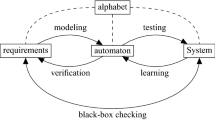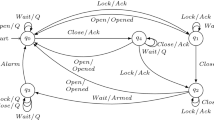Abstract
In Black-Box Checking (BBC) incremental hypotheses of a system are learned in the form of finite automata. On these automata LTL formulae are verified, or their counterexamples validated on the actual system. We extend the LearnLib’s system-under-learning API for sound BBC, by means of state equivalence, that contrasts the original proposal where an upper-bound on the number of states in the system is assumed. We will show how LearnLib’s new BBC algorithms can be used in practice, as well as how one could experiment with different model checkers and BBC algorithms. Using the RERS 2017 challenge we provide experimental results on the performance of all LearnLib’s active learning algorithms when applied in a BBC setting. The performance of learning algorithms was unknown for this setting. We will show that the novel incremental algorithms TTT, and ADT perform the best.
J. Meijer—Supported by STW SUMBAT grant: 13859.
J. van de Pol—Supported by the 3TU.BSR project.
Access this chapter
Tax calculation will be finalised at checkout
Purchases are for personal use only
Similar content being viewed by others
Notes
- 1.
Extensions and equivalences may be defined as in [2] (such as implication: \(\mathop {\implies }\), globally \(\mathop {G}\), and future: \(\mathop {F}\)).
- 2.
- 3.
- 4.
- 5.
Maler and Pnueli is not shown, because it was not able to disprove a single property.
References
Angluin, D.: Learning regular sets from queries and counterexamples. Inf. Comput. 75(2), 87–106 (1987)
Baier, C., Katoen, J.: Principles of Model Checking. MIT Press, Cambridge (2008)
Belinfante, A.: JTorX: exploring model-based testing. Ph.D. thesis, University of Twente, Enschede, Netherlands (2014)
Bloemen, V., van de Pol, J.: Multi-core SCC-based LTL model checking. In: Bloem, R., Arbel, E. (eds.) HVC 2016. LNCS, vol. 10028, pp. 18–33. Springer, Cham (2016). https://doi.org/10.1007/978-3-319-49052-6_2
Bollig, B., Katoen, J.-P., Kern, C., Leucker, M., Neider, D., Piegdon, D.R.: libalf: the automata learning framework. In: Touili, T., Cook, B., Jackson, P. (eds.) CAV 2010. LNCS, vol. 6174, pp. 360–364. Springer, Heidelberg (2010). https://doi.org/10.1007/978-3-642-14295-6_32
Cimatti, A., Clarke, E., Giunchiglia, E., Giunchiglia, F., Pistore, M., Roveri, M., Sebastiani, R., Tacchella, A.: NuSMV 2: an opensource tool for symbolic model checking. In: Brinksma, E., Larsen, K.G. (eds.) CAV 2002. LNCS, vol. 2404, pp. 359–364. Springer, Heidelberg (2002). https://doi.org/10.1007/3-540-45657-0_29
Frohme, M.: Active automata learning with adaptive distinguishing sequences. Master’s thesis, Technische Universität Dortmund (2015)
Fujiwara, S., von Bochmann, G., Khendek, F., et al.: Test selection based on finite state models. IEEE Trans. Softw. Eng. 17(6), 591–603 (1991)
Holzmann, G.J.: The SPIN Model Checker - Primer and Reference Manual. Addison-Wesley, Boston (2004)
Howar, F.: Active learning of interface programs. Ph.D. thesis, Dortmund University of Technology (2012)
Isberner, M.: Foundations of active automata learning: an algorithmic perspective. Ph.D. thesis, Technical University Dortmund, Germany (2015)
Isberner, M., Howar, F., Steffen, B.: The open-source LearnLib - a framework for active automata learning. In: Kroening, D., Păsăreanu, C.S. (eds.) CAV 2015. LNCS, vol. 9206, pp. 487–495. Springer, Cham (2015). https://doi.org/10.1007/978-3-319-21690-4_32
Isberner, M., Howar, F., Steffen, B.: The TTT algorithm: a redundancy-free approach to active automata learning. In: Bonakdarpour, B., Smolka, S.A. (eds.) RV 2014. LNCS, vol. 8734, pp. 307–322. Springer, Cham (2014). https://doi.org/10.1007/978-3-319-11164-3_26
Jasper, M., Fecke, M., Steffen, B., et al.: The RERS 2017 challenge and workshop (invited paper). In: SPIN, Santa Barbara, CA, USA, 10–14 July 2017, pp. 11–20 (2017)
Kant, G., Laarman, A., Meijer, J., van de Pol, J., Blom, S., van Dijk, T.: LTSmin: high-performance language-independent model checking. In: Baier, C., Tinelli, C. (eds.) TACAS 2015. LNCS, vol. 9035, pp. 692–707. Springer, Heidelberg (2015). https://doi.org/10.1007/978-3-662-46681-0_61
Kearns, M.J., Vazirani, U.V.: An Introduction to Computational Learning Theory. MIT Press, Cambridge (1994)
Khosrowjerdi, H., Meinke, K., Rasmusson, A.: Learning-based testing for safety critical automotive applications. In: Bozzano, M., Papadopoulos, Y. (eds.) IMBSA 2017. LNCS, vol. 10437, pp. 197–211. Springer, Cham (2017). https://doi.org/10.1007/978-3-319-64119-5_13
Maler, O., Pnueli, A.: On the learnability of infinitary regular sets. Inf. Comput. 118(2), 316–326 (1995)
Meinke, K.: Learning-based testing of cyber-physical systems-of-systems: a platooning study. In: Reinecke, P., Di Marco, A. (eds.) EPEW 2017. LNCS, vol. 10497, pp. 135–151. Springer, Cham (2017). https://doi.org/10.1007/978-3-319-66583-2_9
Meinke, K., Sindhu, M.A.: Incremental learning-based testing for reactive systems. In: Gogolla, M., Wolff, B. (eds.) TAP 2011. LNCS, vol. 6706, pp. 134–151. Springer, Heidelberg (2011). https://doi.org/10.1007/978-3-642-21768-5_11
Meinke, K., Sindhu, M.A.: LBTest: a learning-based testing tool for reactive systems. In: ICST, Luxembourg, 18–22 March 2013, pp. 447–454 (2013)
Merten, M., Howar, F., Steffen, B., Margaria, T.: Automata learning with on-the-fly direct hypothesis construction. In: Hähnle, R., Knoop, J., Margaria, T., Schreiner, D., Steffen, B. (eds.) ISoLA 2011. CCIS, pp. 248–260. Springer, Heidelberg (2012). https://doi.org/10.1007/978-3-642-34781-8_19
Peled, D.A., Vardi, M.Y., Yannakakis, M.: Black box checking. J. Autom. Lang. Comb. 7(2), 225–246 (2002)
Raffelt, H., Steffen, B., Margaria, T.: Dynamic Testing Via Automata Learning. In: Yorav, K. (ed.) HVC 2007. LNCS, vol. 4899, pp. 136–152. Springer, Heidelberg (2008). https://doi.org/10.1007/978-3-540-77966-7_13
Rivest, R.L., Schapire, R.E.: Inference of finite automata using homing sequences. Inf. Comput. 103(2), 299–347 (1993)
Sindhu, M.A.: Algorithms and tools for learning-based testing of reactive systems. Ph.D. thesis (2013)
Steffen, B., Howar, F., Merten, M.: Introduction to active automata learning from a practical perspective. In: Bernardo, M., Issarny, V. (eds.) SFM 2011. LNCS, vol. 6659, pp. 256–296. Springer, Heidelberg (2011). https://doi.org/10.1007/978-3-642-21455-4_8
Steffen, B., Isberner, M., Naujokat, S., et al.: Property-driven benchmark generation: synthesizing programs of realistic structure. STTT 16(5), 465–479 (2014)
Steffen, B., Jasper, M., et al.: Property-preserving generation of tailored benchmark Petri nets. In: ACSD, Zaragoza, Spain, 25–30 June 2017, pp. 1–8 (2017)
Timmer, M., Brinksma, E., Stoelinga, M.: Model-based testing. In: Software and Systems Safety - Specification and Verification, pp. 1–32 (2011)
Acknowledgements
We want to thank the developers of the AutomataLib, and the LearnLib; without the extraordinary design of those tools, this work would not have been possible. Furthermore, we would like to thank Frits Vaandrager for his useful feedback on a draft version of this paper.
Author information
Authors and Affiliations
Corresponding author
Editor information
Editors and Affiliations
Rights and permissions
Copyright information
© 2018 Springer International Publishing AG, part of Springer Nature
About this paper
Cite this paper
Meijer, J., van de Pol, J. (2018). Sound Black-Box Checking in the LearnLib. In: Dutle, A., Muñoz, C., Narkawicz, A. (eds) NASA Formal Methods. NFM 2018. Lecture Notes in Computer Science(), vol 10811. Springer, Cham. https://doi.org/10.1007/978-3-319-77935-5_24
Download citation
DOI: https://doi.org/10.1007/978-3-319-77935-5_24
Published:
Publisher Name: Springer, Cham
Print ISBN: 978-3-319-77934-8
Online ISBN: 978-3-319-77935-5
eBook Packages: Computer ScienceComputer Science (R0)





